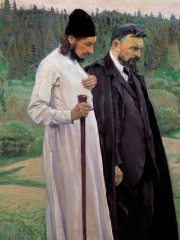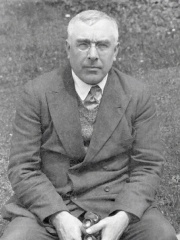
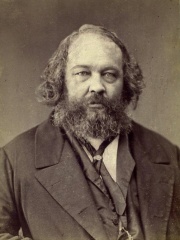
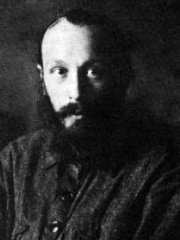
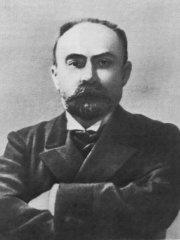
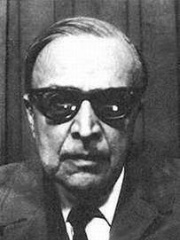
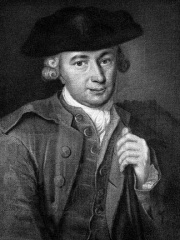
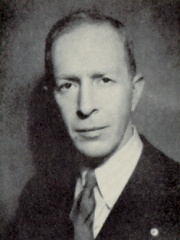
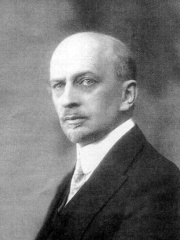
The Most Famous
PHILOSOPHERS from Russia
This page contains a list of the greatest Russian Philosophers. The pantheon dataset contains 1,267 Philosophers, 30 of which were born in Russia. This makes Russia the birth place of the 12th most number of Philosophers behind Spain, and Poland.
Top 10
The following people are considered by Pantheon to be the top 10 most legendary Russian Philosophers of all time. This list of famous Russian Philosophers is sorted by HPI (Historical Popularity Index), a metric that aggregates information on a biography's online popularity. Visit the rankings page to view the entire list of Russian Philosophers.

1. Immanuel Kant (1724 - 1804)
With an HPI of 92.35, Immanuel Kant is the most famous Russian Philosopher. His biography has been translated into 178 different languages on wikipedia.
Immanuel Kant (born Emanuel Kant; 22 April 1724 – 12 February 1804) was a German philosopher. Born in Königsberg, he is considered one of the central thinkers of the Enlightenment. His comprehensive and systematic works in epistemology, metaphysics, ethics, and aesthetics have made him one of the most influential and highly discussed figures in modern Western philosophy. In his doctrine of transcendental idealism, Kant argued that space and time are mere "forms of intuition [German: Anschauung]" that structure all experience and that the objects of experience are mere "appearances". The nature of things as they are in themselves is unknowable to us. Nonetheless, in an attempt to counter the philosophical doctrine of skepticism, he wrote the Critique of Pure Reason (1781/1787), his best-known work. Kant drew a parallel to the Copernican Revolution in his proposal to think of the objects of experience as conforming to people's spatial and temporal forms of intuition and the categories of their understanding so that they have a priori cognition of those objects. Kant believed that reason is the source of morality and that aesthetics arises from a faculty of disinterested judgment. Kant's religious views were deeply connected to his moral theory. Their exact nature remains in dispute. He hoped that perpetual peace could be secured through an international federation of republican states and international cooperation. His cosmopolitan reputation is called into question by his promulgation of scientific racism for much of his career, although he altered his views on the subject in the last decade of his life.

2. Mikhail Bakunin (1814 - 1876)
With an HPI of 82.22, Mikhail Bakunin is the 2nd most famous Russian Philosopher. His biography has been translated into 92 different languages.
Mikhail Alexandrovich Bakunin (30 May [O.S. 18 May] 1814 – 1 July 1876) was a Russian revolutionary anarchist. He is among the most influential figures of anarchism and a major figure in the revolutionary socialist, social anarchist, and collectivist anarchist traditions. Bakunin's prestige as a revolutionary also made him one of the most famous ideologues in Europe, gaining substantial influence among radicals throughout Russia and Europe. Bakunin grew up in Pryamukhino, a family estate in Tver Governorate. From 1840, he studied in Moscow, then in Berlin, hoping to enter academia. Later in Paris, he met Karl Marx and Pierre-Joseph Proudhon, who deeply influenced him. Bakunin's increasing radicalism ended hopes of a professorial career. He was expelled from France for opposing the Russian Empire's occupation of Poland. After participating in the 1848 Prague and 1849 Dresden uprisings, Bakunin was imprisoned, tried, sentenced to death, and extradited multiple times. Finally, exiled to Siberia in 1857, he escaped via Japan to the United States and then to London, where he worked with Alexander Herzen on the journal Kolokol (The Bell). In 1863, Bakunin left to join the insurrection in Poland, but he failed to reach it and instead spent time in Switzerland and Italy. In 1868, Bakunin joined the International Workingmen's Association, leading the anarchist faction to rapidly grow in influence. The 1872 Hague Congress was dominated by a struggle between Bakunin and Marx, who was a key figure in the General Council of the International and argued for the use of the state to bring about socialism. In contrast, Bakunin and the anarchist faction argued for the replacement of the state by federations of self-governing workplaces and communes. Bakunin could not reach the Netherlands, and the anarchist faction lost the debate in his absence. Bakunin was expelled from the International for maintaining, in Marx's view, a secret organisation within the International, and founded the Anti-Authoritarian International in 1872. From 1870 until his death in 1876, Bakunin wrote his longer works such as Statism and Anarchy and God and the State, but he continued to directly participate in European worker and peasant movements. In 1870, he was involved in an insurrection in Lyon, France. Bakunin sought to take part in an anarchist insurrection in Bologna, Italy, but his declining health forced him to return to Switzerland in disguise. Bakunin is remembered as a major figure in the history of anarchism and as an opponent of Marxism, especially of the dictatorship of the proletariat, arguing that Marxist states would be one-party dictatorships ruling over the proletariat, not ruled by the proletariat. His book God and the State has been widely translated and remains in print. Bakunin has had a significant influence on thinkers such as Peter Kropotkin, Errico Malatesta, Herbert Marcuse, E. P. Thompson, Neil Postman and A. S. Neill as well as syndicalist organizations such as the IWW, the anarchists in the Spanish Civil War and contemporary anarchists involved in the modern-day anti-globalization movement.

3. Mikhail Bakhtin (1895 - 1975)
With an HPI of 75.17, Mikhail Bakhtin is the 3rd most famous Russian Philosopher. His biography has been translated into 58 different languages.
Mikhail Mikhailovich Bakhtin (; Russian: Михаи́л Миха́йлович Бахти́н, IPA: [mʲɪxɐˈil mʲɪˈxajləvʲɪdʑ bɐxˈtʲin]; 16 November [O.S. 4 November] 1895 – 7 March 1975) was a Russian philosopher and literary critic who worked on the philosophy of language, ethics, and literary theory. His writings, on a variety of subjects, inspired scholars working in a number of different traditions (Marxism, semiotics, structuralism, religious criticism) and in disciplines as diverse as literary criticism, history, philosophy, sociology, anthropology, and psychology. Although Bakhtin was active in the debates on aesthetics and literature that took place in the Soviet Union in the 1920s, his distinctive position did not become well known until he was rediscovered by Russian scholars in the 1960s.

4. Georgi Plekhanov (1856 - 1918)
With an HPI of 73.78, Georgi Plekhanov is the 4th most famous Russian Philosopher. His biography has been translated into 57 different languages.
Georgi Valentinovich Plekhanov (Russian: Георгий Валентинович Плеханов [ɡʲɪˈorɡʲɪj vəlʲɪnʲˈtʲinəvʲɪtɕ plʲɪˈxanəf] ; 11 December [O.S. 29 November] 1856 – 30 May 1918) was a Russian Marxist theorist, philosopher, and revolutionary. After beginning his revolutionary career as a populist, in 1883 Plekhanov established the Emancipation of Labour group, the first Russian Marxist political organisation. He is widely regarded as the "father of Russian Marxism", and his theoretical works were instrumental in converting a generation of revolutionaries, including Vladimir Lenin, to the cause. Plekhanov was a prominent leader in the Russian Social Democratic Labour Party (RSDLP) and the Second International. In 1900, he collaborated with Lenin in founding the party newspaper Iskra, and at the party's Second Congress in 1903, initially sided with Lenin's Bolshevik faction. However, he soon broke with the Bolsheviks over their organisational principles, which he criticised as overly centralist, and became a leading figure in the opposing Menshevik faction. During the 1905 Russian Revolution, Plekhanov maintained that Russia was only ready for a bourgeois-democratic revolution and argued against what he saw as premature attempts to seize power by the proletariat. During World War I, Plekhanov adopted a staunchly nationalist position, "defensism", in support of the Allied cause, a stance that separated him from most international socialists. He returned to Russia after the 1917 February Revolution and supported the Provisional Government. He was a fierce opponent of the Bolsheviks, denouncing their leader Lenin and warning that their seizure of power in the October Revolution would be a disaster for the country. Plekhanov died of tuberculosis in Finland the following year. Despite his political opposition to the Bolsheviks, Plekhanov was held in high esteem by Lenin and was posthumously enshrined in the Soviet Union as a founding father of Russian Marxism. His contributions to Marxist philosophy, historical materialism, and aesthetics made him one of the most important Marxist thinkers of his era. His legacy remains contested, with some viewing him as a democratic, orthodox Marxist alternative to Leninism, while others focus on his theoretical groundwork that paved the way for the Bolsheviks.
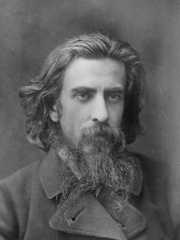
5. Vladimir Solovyov (1853 - 1900)
With an HPI of 71.62, Vladimir Solovyov is the 5th most famous Russian Philosopher. His biography has been translated into 49 different languages.
Vladimir Sergeyevich Solovyov (Russian: Владимир Сергеевич Соловьёв; 28 January [O.S. 16 January] 1853 – 13 August [O.S. 31 July] 1900) was a Russian philosopher, theologian, poet, pamphleteer, and literary critic, who played a significant role in the development of Russian philosophy and poetry at the end of the 19th century and in the spiritual renaissance of the early 20th century.

6. Alexandre Kojève (1902 - 1968)
With an HPI of 69.73, Alexandre Kojève is the 6th most famous Russian Philosopher. His biography has been translated into 33 different languages.
Alexandre Kojève (born Aleksandr Vladimirovich Kozhevnikov; 28 April 1902 – 4 June 1968) was a Russian-born French philosopher and international civil servant whose philosophical seminars had some influence on 20th-century French philosophy, particularly via his integration of Hegelian concepts into twentieth-century continental philosophy.

7. Johann Georg Hamann (1730 - 1788)
With an HPI of 69.67, Johann Georg Hamann is the 7th most famous Russian Philosopher. His biography has been translated into 37 different languages.
Johann Georg Hamann (; German: [ˈhaːman]; 27 August 1730 – 21 June 1788) was a German Lutheran philosopher from Königsberg known as "the Wizard of the North" who was one of the leading figures of post-Kantian philosophy. His work was used by his student J. G. Herder as the main support of the Sturm und Drang movement, and is associated with the Counter-Enlightenment and Romanticism. He introduced Kant, also from Königsberg, to the works of both Hume – waking him from his "dogmatic slumber" – and Rousseau. Hamann was influenced by Hume, but he used his views to argue for rather than against Christianity. Goethe and Kierkegaard were among those who considered him to be the finest mind of his time. He was also a key influence on Hegel and Jacobi. Long before the linguistic turn, Hamann believed epistemology should be replaced by the philosophy of language.

8. Alexandre Koyré (1892 - 1964)
With an HPI of 68.96, Alexandre Koyré is the 8th most famous Russian Philosopher. His biography has been translated into 31 different languages.
Alexandre Koyré (; French: [kwaʁe]; born Alexandr Vladimirovich (or Volfovich) Koyra; 29 August 1892 – 28 April 1964), also anglicized as Alexander Koyre, was a French philosopher of Russian origin who wrote on the history and philosophy of science.

9. Ivan Ilyin (1883 - 1954)
With an HPI of 66.47, Ivan Ilyin is the 9th most famous Russian Philosopher. His biography has been translated into 32 different languages.
Ivan Alexandrovich Ilyin (Russian: Иван Александрович Ильин, romanized: Ivan Aleksandrovich Il'in; 9 April [O.S. 28 March] 1883 – 21 December 1954) was a Russian jurist, religious and political philosopher, publicist, orator, and a far-right thinker. Ilyin began his career as a political writer during the failed 1905 Russian Revolution; by the February Revolution of 1917, which he later saw as a "temporary disorder", he shifted towards liberalism, and by October he became a radical right opponent of democracy. October Revolution, in his view, marked a "national catastrophe". This conviction led him to oppose the Bolshevik regime. As a white émigré journalist, he aligned himself with Slavophile beliefs and emerging as a key ideologue of the Russian All-Military Union. This organization firmly believed that force stood as the sole means through which the Soviet regime could be toppled. An anti-communist, he found himself admiring of Italian fascism and Benito Mussolini and initially, sympathetic to Adolf Hitler and Nazism; yet, his attitude critical of totalitarianism, which he distinguished from his own concept of fascism, was not embraced by the Nazi regime. In 1934, his refusal to comply with Nazi directives to spread propaganda led to his dismissal from the Russian Academic Institute, stripping him of employment opportunities. Financial support from Sergei Rachmaninoff in 1938 allowed Ilyin to remain in Switzerland albeit barred from work or political engagement. This phase of restriction led him to delve deeper into studies encompassing aesthetics, ethics, and psychology. Despite battling chronic illness, Ilyin wrote over 40 books and numerous articles in Russian and German. His works predominantly revolved around religion and Russia, although he diverged from Vladimir Solovyov's (with whom the Russian religious and philosophical Renaissance of the early 20th century is usually associated) ideology, which advocates a global theocracy. Instead, Ilyin championed a patriarchal model of governance for Russia, rooted on Orthodoxy and faith in the autocratic tsar, distinguishing between autocracy and tyranny. His writings echoed calls for heroism and moral aristocracy, while cementing his role as a proponent of the proposition of existence of Western Russophobia. Remaining true to Right Hegelianism throughout his life, Ilyin explored themes of statehood, law, and power in world history. He opposed federalism and neutrality, and disdained Western analytic philosophy. As an ultranationalist, Ilyin was a critic of Western-style democracy, advocating instead for a government aligned with Russia's autocratic heritage. Ilyin's views on Russia's social structure and world history influenced some post-Soviet intellectuals and politicians, including Soviet dissident Aleksandr Solzhenitsyn and Russian president Vladimir Putin.
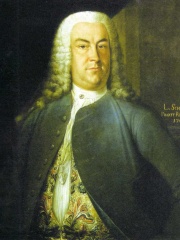
10. Johann Christoph Gottsched (1700 - 1766)
With an HPI of 66.00, Johann Christoph Gottsched is the 10th most famous Russian Philosopher. His biography has been translated into 35 different languages.
Johann Christoph Gottsched (2 February 1700 – 12 December 1766) was a German philosopher, author, critic and grammarian of the Enlightenment.
People
Pantheon has 30 people classified as Russian philosophers born between 1700 and 1947. Of these 30, none of them are still alive today. The most famous deceased Russian philosophers include Immanuel Kant, Mikhail Bakunin, and Mikhail Bakhtin.
Deceased Russian Philosophers
Go to all RankingsImmanuel Kant
1724 - 1804
HPI: 92.35
Mikhail Bakunin
1814 - 1876
HPI: 82.22
Mikhail Bakhtin
1895 - 1975
HPI: 75.17
Georgi Plekhanov
1856 - 1918
HPI: 73.78
Vladimir Solovyov
1853 - 1900
HPI: 71.62
Alexandre Kojève
1902 - 1968
HPI: 69.73
Johann Georg Hamann
1730 - 1788
HPI: 69.67
Alexandre Koyré
1892 - 1964
HPI: 68.96
Ivan Ilyin
1883 - 1954
HPI: 66.47
Johann Christoph Gottsched
1700 - 1766
HPI: 66.00
Sergei Bulgakov
1871 - 1944
HPI: 65.94
P. D. Ouspensky
1878 - 1947
HPI: 65.44
Overlapping Lives
Which Philosophers were alive at the same time? This visualization shows the lifespans of the 25 most globally memorable Philosophers since 1700.

